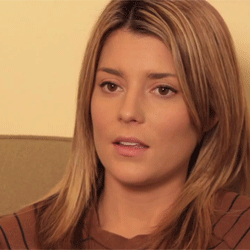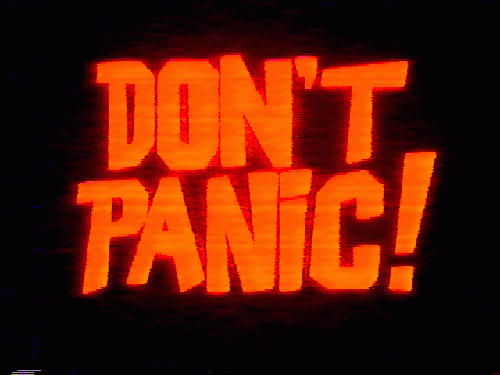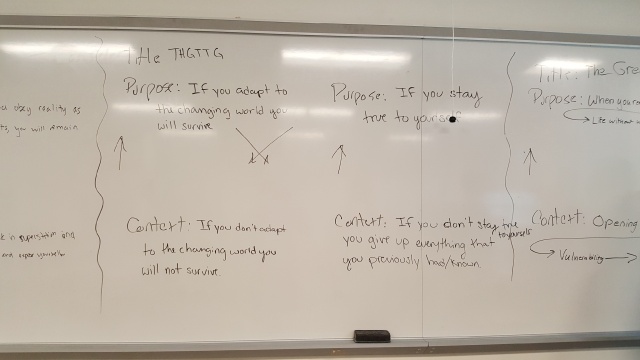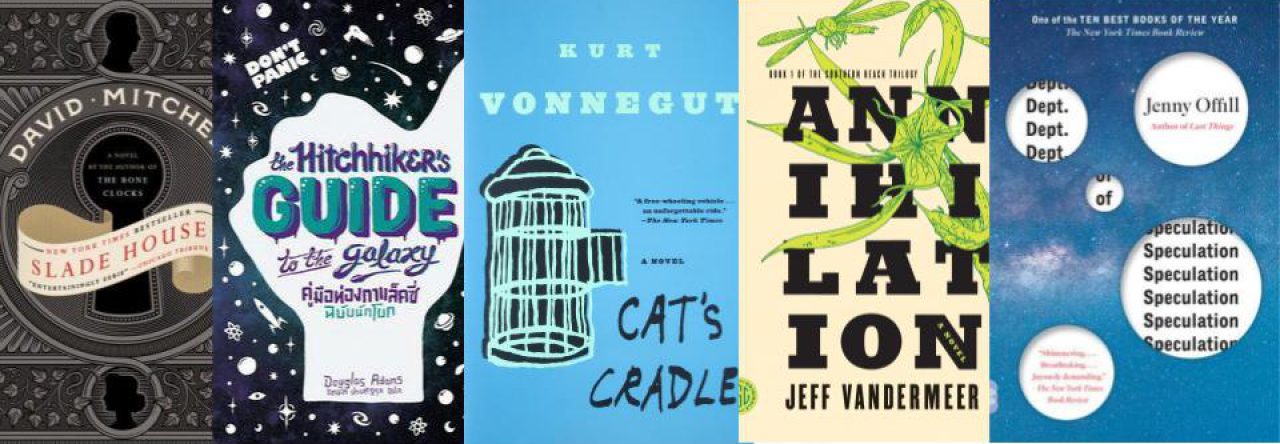What if Earth was voted so insignificant by other planets that is was decidedly to be destroyed to make way for a bypass?

 Arthur Dent’s morning is just like any other or so he thinks. His life takes a strange turn when he learns that his house will be demolished for a new bypass, his best friend is an alien, oh.. And did I mention? All he ever loved including his planet Earth will be destroyed. Within hours he finds himself stowed away on a Vogon’s spaceship. To make matters worse the Vogons are, according to the hitchhikers guide, the most unpleasant race in the Galaxy. With any hopes of survival he will need to stick close to his alien friend Ford Prefect and The Hitchhikers guide to the galaxy to survive this changing world.
Arthur Dent’s morning is just like any other or so he thinks. His life takes a strange turn when he learns that his house will be demolished for a new bypass, his best friend is an alien, oh.. And did I mention? All he ever loved including his planet Earth will be destroyed. Within hours he finds himself stowed away on a Vogon’s spaceship. To make matters worse the Vogons are, according to the hitchhikers guide, the most unpleasant race in the Galaxy. With any hopes of survival he will need to stick close to his alien friend Ford Prefect and The Hitchhikers guide to the galaxy to survive this changing world.
Our Journey through space has just begun and I cannot wait to see where it take us. Let the adventure begin!
Oh, and Don’t forget your towel!
“The Hitchhiker’s Guide to the Galaxy. It’s a sort of electronic book. It tells you everything you need to know about anything. That’s it’s job (P.52).”
Before reading this book, I was having major anxiety that I would not be able to understand this particular genre. I have never actually read a science fiction book so I was not sure what to expect. I decided it was best if I pushed past my reluctance and dove in blindly by just accepting the text as it was. A few times throughout the text, however, I found myself projecting what I thought the text was trying to say. Being aware of this bad habit of guessing what the author is trying to achieve, helps me to stop and refocus on letting the story be told as it is. In the end, I hope to be able to understand the conventions of the science fiction genre.

I treated the first section of the book as a basis of reading for discovering the underlying network of controlling values. This is a skill that I am still developing, so this approach is really pushing me further out of my comfort zone. (Kind of like Arthur being thrusted out of the comfort of his planet and into the unknown galaxy.)
My group members and I had the opportunity to discuss possible controlling and counter ideas that are evident in this book. Here is the chart we created:

After class, I was able to play around a bit with this information and expand on it a bit. I am curious to see if this network of controlling values will still ring true in the end.
Purpose: If you adapt to the changing world around you, you will survive.
Context: If you are reluctant to adapt to the changing world, you will not survive.
Purpose: If you stick to your comfort zone, you stay true to yourself.
Context: If you step out of your comfort zone, you may go against your values.
We were able to come up with this network of controlling ideas but referring to McKee’s definition of Controlling idea.
According to Mckee, “ A CONTROLLING IDEA may be expressed in a single sentence describing how and why life undergoes change from one condition of existence at the beginning to another at the end (McKee 115.)”
We see this “change in existence” in the text as Arthur is forced to leave behind all he has ever known when his planet is destroyed. He is now faced with the decision to either adapt to his new environment or to stay true to his ways. We see an example of this n the text:
“You just come along with me and have a good time. The Galaxy’s a fun place. You’ll need to have this fish in your ear.”
“I beg your pardon?” asked Arthur, rather politely he thought (P.55)”
We see that Arthur is struggling between deciding whether he should adapt or resist.
I predict that by the end of the book we will see a progression in Arthur’s personality. I believe he will go from someone who is used to going through life not questioning much to stepping out of his comfort zone.
Value Graph: (Chapter 5 p. 45-56)
+ Arthur learns that they are on a Vogon’s Spaceship
– Arthur asks when he can go home and learns that Earth has been destroyed.
+Arthur joins Ford on the mattress to see the Hitchhiker’s guide.
-Arthur panics and begins to freak out
+Ford tells Arthur to look at the book and stop panicking.
-Ford asks him to join him and have fun in the Galaxy. Arthur is reluctant.
-Ford tells him to put a fish in his ear in order to understand the Vogon’s speech but Arthur is still reluctant.
+Ford shoves the fish in Arthur’s ear. At first Arthur tried to take it out but then he stopped resisting and started listening to the Vogons.
GIFs from Giphy.com

I really liked your use of Gifs. The don’t panic one was perfect for this book and it also related to you trying to read a genre you don’t normally read. It tied the two concepts together, and it also looked cool.
I also liked how you edited our network of controlling values, you cleaned them up a little from where we had them in class. I still think our counter controlling values need some more thought. They don’t feel like angels are singing, in my opinion.
I liked that you also brought a quote from McKee into your post. I thought that was very helpful to show what we were even talking about with the concept, network of controlling values.
LikeLike
Thank You!
LikeLike
Hey Brittany! You touch on some really great things in the blog. I particularly liked the quote about putting a fish in your ear. I decided to go back and look at where this quote is in the text.
“You just come along with me and have a good time. The Galaxy’s a fun place. You’ll need to have this fish in your ear.”
“I beg your pardon?” asked Arthur, rather politely he thought.
Ford was holding up a small glass jar which quite clearly had a small yellow fish wriggling around in it. Arthur blinked at him. He wished there was something simple and recognizable he could grasp hold of…but he couldn’t, and he didn’t feel safe. (55)
I thought I would delve deeper and try to make a value graph out of this passage. So we start with Ford talking about how the Galaxy can be fun, as long as Arthur puts a fish in his ear. Ford is definitely for the first controlling value. Ford is saying that the only way to thrive and enjoy the Galaxy is to step out of your comfort zone and adapt (by putting a fish in your ear). This startles Arthur when he asks “I beg your pardon?” He pulls away and leans toward the opposing value, which is that urge to remain in his comfort zone. Ford presents the first controlling value again when he holds up the fish. He is presenting Arthur with the opportunity to take a risk and adapt. But Arthur pulls back to the opposing controlling value when he “wished there was something simple and recognizable he could grasp hold of” Arthur is clinging to the familiar and what he knows even when its not there. He reinforces this when “he didn’t feel safe.” The lack of familiarity is negative for Arthur. The unknown is scary and dangerous, to put it simply. It seems like Arthur is still clinging to the opposing value. I wonder if this will change!
LikeLike
Hi Laura,
I, coincidentally, attempted to value graph the same section of the text as you did. Because I am so new to this, I was beyond excited to see that our graphs where a bit similar. However, my graph ended with Arthur giving into the controlling value (+). On page 56 it says that Arthur reacted by “gasping with horror he scrabbled at his ear for a second or so, but then slowly turned goggle-eyed with wonder.” I think this portrays how Arthur is at first very reluctant but in the end is confirming to this new situation. The fact that he attempted to take out the fish for only a few seconds shows his resistance is fading. We see that his curiosity is helping to fuel this transition out of his comfort zone. I do not believe we will see him fully embracing his new surroundings until the end of the book. Unfortunately, at this point, I do not believe he really has any choice.
LikeLike
Hey Brittany! Very nice post! Like the others, I really enjoyed your use of the GIFs. It was really easy to follow and I found it very helpful that you included McKee’s quotes to highlight your point.
The initial network of controlling values was nicely cleaned up. Maybe you could have expanded more on it, giving specific examples to show each part of the network.
I don’t have much else to say, since the others have already touched on things.
Good Job!
LikeLiked by 1 person
Thank you Alex!
LikeLike
Pingback: Don’t Put That Fish in My Ear – How Writers Read
First of all, it is commendable that you begin by admitting to your own personal bias when it comes to the genre at hand, and any complications that may arise because of that. You specifically mention reading the text for what it was, rather than what it ought to be, which is essentially what close reading implies. However, your anxiety perhaps led to some slip-ups here and there when it comes to understanding the true intentions of the author. projecting your own ideas instead.
Your analysis of the controlling values and the stepwise fashion in which you approached them is fantastic. You provide strong evidence not only in the form of our detailed value graph but also with plenty of real support from the text itself to back up your statements and ideas.
LikeLike